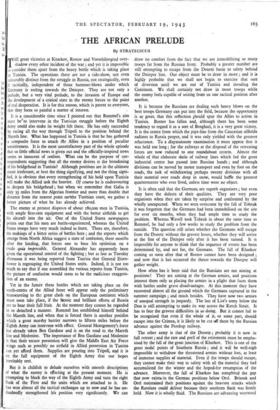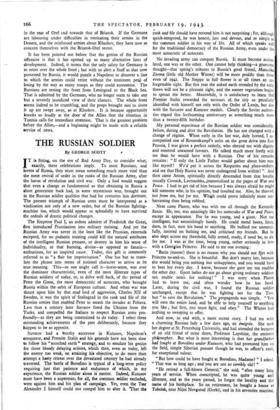THE AFRICAN PRELUDE
By STRATEC ICUS
THE great victories at Knarkov, Rostov and Voroshilovgrad over- shadow every other incident of the war ; and yet it is impossible to consider them apart from the heavy battle which is taking place in Tunisia. The operations there are not a side-show, not even colourably distinct from the struggle in Russia, not strategically, even if tactically, independent of those hammer-blows under which Germany is reeling towards the Dnieper. They are not only a prelude, but a very vital prelude, to the invasion of Europe and the development of a critical state in the enemy forces to the point of real desperation. It is for this reason, which is patent to everyone, that they form so painful a matter of interest.
It is a considerable time since I pointed out that Rommel's aim must bet() intervene in the Tunisian struggle before the Eighth Army could also make its weight felt there. He has only succeeded by racing all the way through Tripoli to the position behind the Mareth line. What has happened in Tunisia is that he has gathered a composite force to attack die Allies in a position of peculiar sensitiveness. It is the most unsatisfactory part of the whole episode that so little official news is given out and the officially-inspired news seems so innocent of realism. What can be the purpose of cor- respondents suggesting that all the enemy desires is the broadening of his bridgehead in Tunisia? Although positions are in the ultimate count irrelevant, at best the thing signifying, and not the thing signi- fied, it is obvious that every strengthening of his hold upon Tunisia will make the Allied task the heavier. Of course he is endeavouring to deepen his bridgehead ; but when we remember that Gafsa is only 35 miles from the Algerian frontier and more than double that distance from the nearest point onAthe Tunisian coast, we gather a better picture of what he has already achieved.
The enemy at present disposes of about 18o,000 men in Tunisia, with ample first-rate equipment and with the better airfields to get his aircraft into the air. One of the United States newspapers points out that his men are battle-experienced, whereas the United States troops have very much indeed to learn. There are, therefore, the makings of a bitter series of battles here ; and the reports which emerge from North Africa suggest a state of confusion, three months after the landing, that forces one to base his optimism on a credo quia impossible. General Alexander has apparently been given the operational control of the fighting ; but as late as Tuesday afternoon it was being reported from Tunisia that General Eisen- hower is regrouping the United States units. Indeed, it is not too much to say that if one assembled the various reports from Tunisia, the picture of confusion would seem to be the malicious exaggera- tion of an enemy.
Yet in the future these battles which are taking place on the south-centre of the Allied front will appear only the preliminary manoeuvring to the great clash on the European continent which must soon take place, if the heroic and brilliant efforts of Russia are to bear their full fruit. At the moment they cannot be regarded in so detached a manner. Rommel has established himself behind the Mareth line, and when that is forced there is another position which a great marshy barrier narrows to fifteen miles before the Eighth Army can intervene with effect. General Montgomery's force has already taken Ben Gardane and is on the road to, the Mareth line and Medenine. The importance of Ben Gardane and Medenine is that their secure possession will give the Middle East Air Force wings such as possibly no airfield in Allied possession in Tunisia can yet afford them. Supplies are pouring into Tripoli, and it is on the full equipment of the Eighth Army that our hopes inevitably rest.
But it is childish to delude ourselves with smooth descriptions of what the enemy is effecting at the present moment. He is attempting to block the way of the Fighth Army and turn the right flank of the First and the units which are attached to it. He has won almost all the tactical exchanges up to now and he has un- doubtedly strengthened his position very significantly. We can
draw no comfort from the fact that we are immobilising so many troops far from the Russian front. Probably a greater number are still attempting to escape from the Donetz basin to safety behind the Dnieper line. Our object must be to draw in more ; and it is highly probable that we shall not begin to exercise that sort of diversion until we are out of Tunisia and invading the Continent. We shall certainly not draw in more troops while the enemy feels capable of seizing from us one tactical position after another.
It is because the Russians are dealing such heavy blows on the best troops Germany can put into the field, because the opportunity is so great, that this reflection should spur the Allies to action in Tunisia. Rostov has fallen and, although there has been some tendency to regard it as a sort of Benghazi, it is a very great victory. It is the centre from which the pipe-line from the Caucasian oilfields radiates to Russia proper, and it was only yielded with the greatest reluctance. To a dispassionate examination it must appear that it was held too long ; for the railways at the disposal of the retreating forces are now reduced to one roundabout system. Almost the Whole of that elaborate skein of railway lines which fed the great industrial centre has passed into Russian hands ; and although divisions can be moved by motor transport and even by foot on the roads, the task of withdrawing perhaps twenty divisions with all their material over roads deep in snow, would baffle the 'greatest quartermaster who ever lived, unless time were no object.
It is often said that the Germans are superb organisers ; but even they have the defects of their qualities. They are very poor organisers when they are taken by surprise and confronted by the wholly unexpected. When we were overcome by the fall of Tobruk it was forgotten that the Germans had been immobilised on the site for over six months, when they had ample time to study the problem. Whereas Wavell took Tobruk in about the same time as Rommel, he had only a few weeks to study the problem from the outside. The question still arises whether the Germans will escape from the Donetz without the gravest losses, whether they will arrive at the line of the Dnieper only after it has been turned. It is impossible for anyone to think that the sequence of events has been determined by, and not for, the Germans. The fall of Kharkov coming so soon after that of Rostov cannot have been designed ; and .now that it has occurred the thrust towards the Dnieper will gather weight.
How often has it been said that the Russians are not aiming at positions! They are aiming at the German armies, and positions interest them only as placing the armies in a plight that faces them with battles under grave disadvantages. At this moment they have recovered almost all the ground which the Germans captured in the summer campaign ; and much besides. They have now two armies of unequal strength in jeopardy. The last of List's army below the Don is still attempting to make its way across the Kerch Strait. It has to face the gravest difficulties in so doing. But it cannot fail to be recognised that even if the whole of it, or some part, should escape into the Crimea, it is likely to be cut off there by the Russian advance against the Perekop railway.
The other army is that of the Donetz ; probably it is now in full retreat ; and the rate and peril of the retirement must be empha- sised by the fall of the great junction of Kharkov. This is one of the great nodal points of Southern Russia ; and it will be well-nigh impossible to withdraw the threatened armies without loss, at least of immense supplies of material. Even if the troops should escape, they cannot make their way to safety with all the material they had accumulated for the winter and the hoped-for resumption of the advance. Moreover, the fall of Kharkov has completed the gap that now exists, in the German positions below Orel. Briansk and Orel maintained their positions against the heaviest attacks which the Russians could deliver because their southern flank was firmly held. Now it is wholly fluid. The Russians are advancing westward in the rear of Orel and towards that of Briansk. If the Germans are labouring under difficulties in extricating their armies in the Donetz, and the reinforced armies about Kharkov, they have now to concern themselves with the Briansk-Orel sector.
It has been pointed out before that the genius of the Russian offensive is that it has opened up so many alternative lines of development. Indeed, it seems that the only safety for Germany is to retire over the whole front ; but with so alert a Staff as that now possessed by Russia, it would puzzle a Napoleon to discover a line to which the armies could retire without the imminent peril of losing by the way as many troops as they could economise. The Russians are testing the front from Leningrad to the Black Sea. That is admitted by the Germans, who no longer seem to take any but a severely jaundiced view of their chances. The whole front seems indeed to be crumbling, and the props brought east to shore it up are swept away, as at Kharkov. It is because opportunity knocks so loudly at the door of the Allies that the situation in Tunisia calls for immediate attention. That is the greatest problem before the Allies,—and a beginning might be made with a reliable service of news.



























 Previous page
Previous page